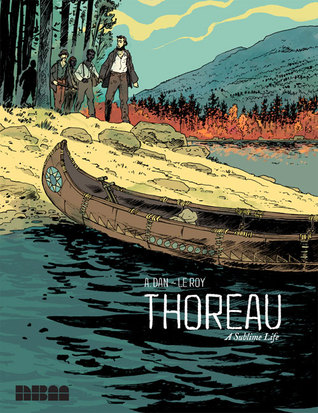Review: Thoreau - A Sublime Life
One of the rules for writing a good biography is maintaining some emotional distance from your subject. That doesn’t mean you should only be negative about a person, or positive, or even that you can’t make judgments about that person’s life. I would be wary of anybody who wrote a biography of Hitler, for example, without feeling some level of horror or revulsion. But you can’t let that horror stop you from trying to understand your subject. Similarly, you can’t allow love or admiration of a person to stop you from actually analyzing them.
That’s one of the fundamental problems with Thoreau: A Sublime Life. The book is a ninety-page biography of Henry David Thoreau, mostly focusing on his life at Walden Pond and afterward. It focuses on his philosophy, his antiwar activism, and his abolitionism. However, it never delves too deeply into any of those, instead merely presenting them to the reader and then moving on to the next thing. You can read this entire book and get no closer to Thoreau as a subject; at its worst, it just reads as a selection of Thoreau’s quotes with some illustrations. Furthermore, it practically sprints through his writings and life, giving you just a taste of each but not pausing to examine them.
One of the biggest blocks for this book is that there’s virtually no dialogue, at least in the sense of a back-and-forth. So much of Thoreau’s dialogue is taken from what he wrote that you’re basically just reading excerpts for much of it. How can characters respond to any of that? There’s no room for conversation. Even where Le Roy goes off-script so to speak, none of the characters actually seem to speak: when he’s bailed out of jail by his aunt, she utters some complaint about his behavior, and he brushes her off with a quip. That’s all of the dialogue: people either express disbelief or admiration, and Thoreau goes back to narrating. This actually does a disservice to Thoreau’s ideas, which are deserving of some discussion.

Unfortunately, civil disobedience, anti-commercialism, even budding environmentalism are all introduced and moved past at a breakneck pace. This also simplifies Thoreau’s ideas or writings unacceptably in some places. The book shows Thoreau going to Maine and his time in the Maine wilderness, but Thoreau draws different conclusions about nature and man’s place therein than what he does in Walden. Nature could be frightening, “savage and awful” in Thoreau’s worlds, not the pleasant forest excursion it’s made to be here. Likewise, the author makes no attempt to understand to what extent Walden was an experiment in minimalistic living versus a manifesto.
Part of the problem is that there are a lot of weird little details that are just wrong in this book. Admittedly, I’m the kind of person who goes hunting for historical inaccuracies or anachronisms, so maybe these won’t bother another reader quite as much as they do for me. Still, if you’re going to examine a human subject, you ought to get their character right. There’s one page where Thoreau drinks coffee with a neighbor, which makes no sense. Thoreau devotes a fair bit of Walden to decrying the consumption of coffee, saying “I believe that water is the only drink for a wise man; wine is not so noble a liquor; and think of dashing the hopes of a morning with a cup of warm coffee…” Or how about the part when people are congratulating Thoreau on the success of Walden? The book several years to even sell 2,000 copies, and while critics were not hostile to it, it didn’t immediately catapult Thoreau into fame either.
Or, more importantly, why does the author set up a conversation between Thoreau and John Brown? There’s no evidence that the two men ever knew each other, and it’s the kind of thing a children’s history book would do. It simplifies the history and tries to make it easily understandable, which then robs it of the importance it had in the first place. You could do an entire book on Thoreau’s abolition, and it would simply be enough to have Thoreau read from “A Plea for Captain John Brown” and parse people’s reactions to it. That would set up an interesting conversation between Thoreau and other people where they could actually debate the merits of violent activism and how far one should be willing to go in the defense of others or one’s beliefs.
This view of Thoreau is also so uncritical and full of admiration that at times it also reads like a love letter to Thoreau. The biographical essay at the back of the book is actually more useful in this regard because it does at least mention a few of Thoreau's blindspots, such as the fact that he had a pretty low opinion of women's intellects and capacities. None of that is in the main pages though, and you shouldn't have to read the explanatory essay of a biographical comic in order to appreciate the comic in the first place. What about Thoreau's tone, which frequently verges on preachy? That seems to escape both the narration and the dialogue.
I couldn’t help but feel that this might have been more effective if it had focused on one aspect of Thoreau in depth, rather than trying to cover his entire life in ninety pages. As it stands, you don’t walk away knowing much more than you would have just reading up on Thoreau through Wikipedia.
[su_box title="Score: 2/5" style="glass" box_color="#8955ab" radius="6"]
Thoreau: A Sublime Life Writer: Maximilien Le Roy Writer: A. Dan Publisher: NBM Publishing Price: $19.99 Format: One-shot
[/su_box]
